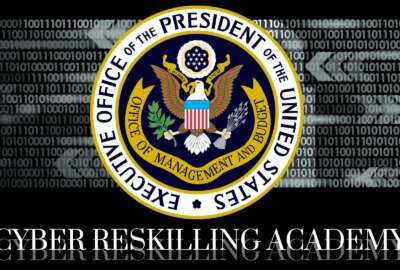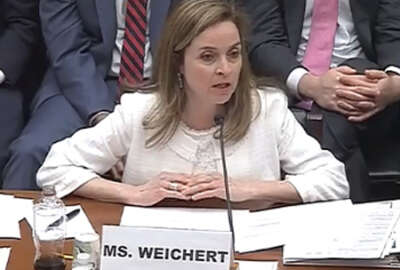
Why NSF wants to start a conversation about reskilling in the federal workforce
The National Science Foundation is looking for concrete, technological ideas through the Career Compass Challenge that it could pilot broad reskilling effort across...
Best listening experience is on Chrome, Firefox or Safari. Subscribe to Federal Drive’s daily audio interviews on Apple Podcasts or PodcastOne.
The National Science Foundation has set out to prove that the amorphous concept of “reskilling” doesn’t need to be so scary in government.
NSF’s Career Compass Challenge, which the agency launched back in November, will soon solicit for prototypes that NSF — and later all of government — can use to match existing federal employees and their skills to other kinds of work.
It’s a government challenge in the traditional sense that participants have deadlines and winners earn prize money. But the leaders behind the Career Compass Challenge say it’s more than a competition; it’s a conversation-starter.
The goal is to get the federal workforce, industry, academia and others thinking about “the future of work that’s different than the way federal employees currently think about their work,” Dorothy Aronson, NSF’s chief information officer, said in a recent interview with Federal News Network.
“Reskilling” has become a bit of a buzz word in the federal government over the last year. It’s certainly a priority for the Trump administration, which has discussed the need to redeploy existing federal human resources to take on new and future work in the President’s Management Agenda at a symposium at the White House last fall. The Federal Cyber Reskilling Academy launched last year in an effort to retrain certain employees to become cyber defense analysts.
Still, there are more unanswered questions about the future of reskilling in the federal workforce. There’s little public data that suggests exactly how many employees the administration believes could be redeployed to new work, partly because there are so many unknowns about what that future will look like.
“We don’t know what jobs will exist in the future, but that’s not as important as knowing that my career will change over time,” said Aronson, who serves as one of the reskilling goal leaders for the PMA. “It’s an intellectual change, not as specific as I’m going to be a data scientist or cyber expert.”
That’s why Aronson, along with Robyn Rees, an IT strategy adviser at NSF, view the Career Compass Challenge as a chance to solicit specific ideas to continuously reskill the federal workforce — and kick-start a broader conversation about what it will take to shed the culture of stability over modernization.
“Technology is not just the driver for reskilling, but it can and should be an enabler,” Rees said. “As technologists, the easiest thing to do is roll out the technology solution. The responsible thing to do is bring the people along with you. We challenged ourselves and everybody we’ve talked to for the past year to try to play it forward.”
Both Aronson and Rees have been sharing and discussing this concept with their colleagues in the NSF IT workforce. Aronson distributed the Myers-Briggs personality inventory to her team as a starting point.
“An important part of work is not whether you’re a Unix developer or a customer support person, it’s what is it about me that’s uniquely human? What do I enjoy? What am I good at? How do I want my work to be?” Aronson said. “It’s [about] getting to know yourself and what will make you … energized and happy throughout your career.”
Both Aronson and Rees acknowledged that the picture they’re painting now of a movable, flexible workforce that can adapt to both rapidly-changing technology and the evolving skills and interests of employees themselves is a lofty goal under the existing civil service structure.
The General Schedule is rigid and generally discourages federal employees from exploring other interests and career paths.
An overhaul of the General Schedule or any of the other civil service modernization ideas that have become popular talking points in recent years aren’t part of the discussions for Aronson and Rees. Those conversations are happening in other pockets of government, they said.
“We’re able to enter these conversations without the constraints of, ‘Well, will it work? Can it work? Will it be possible?'” she said. “In our minds, yes, it will work. We believe that we will get there. What we can do while other people are doing the very important work of looking at those rules and regulations … is we can test things and figure out how we reach adult learners where they sit at their desks during the day.”
Related Stories

Federal Cyber Reskilling Academy to retrain federal employees as cyber defense analysts
For now, the NSF team wants as many people as possible to participate in the Career Compass Challenge and join the reskilling conversation.
The first phase of the challenge, which recently closed Feb. 13, simply called for ideas.
Between the two phases, NSF plans to host a webcast or open conversation with participants and members of the public. The agency will announce the winners and discuss what it learned from the submissions in the first phase. NSF will choose anywhere between one and five white papers as winners, and they’ll receive a $5,000 prize.
Phase two will call for prototypes, but the competition again will be open to anyone who wants to participate, Aronson said. NSF will choose one prototype as the “winner” for phase two.
“We believe that there are some people who have ideas that they did not necessarily want to share in the first part, because they didn’t want those ideas published,” she said. “It’s possible there are already people working toward the second objective.”
NSF is still deciding when exactly it will announce round one winners and begin phase two of the career challenge.
Copyright © 2025 Federal News Network. All rights reserved. This website is not intended for users located within the European Economic Area.
Nicole Ogrysko is a reporter for Federal News Network focusing on the federal workforce and federal pay and benefits.
Follow @nogryskoWFED




